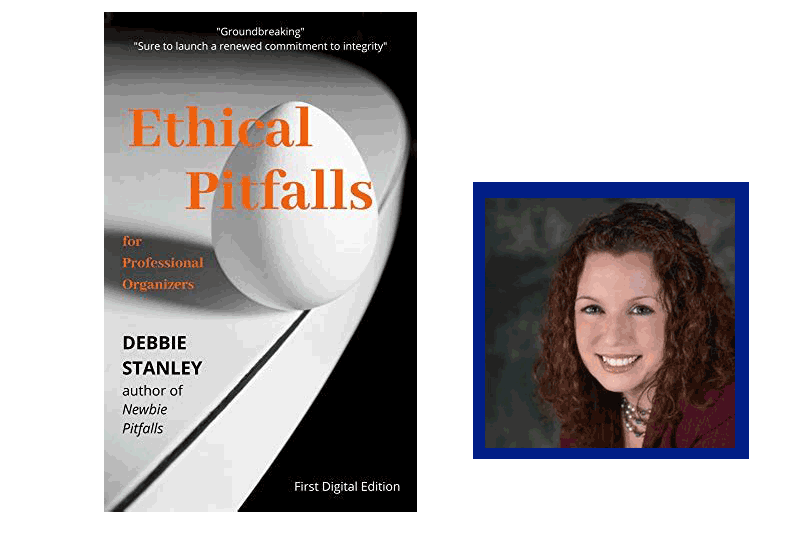Ethical Considerations for Organizers: Navigating Sensitive Situations With Integrity
This page may contain links to Amazon.com or other sites from which I may receive commission on purchases you make after clicking on such links. Read my full Disclosure Policy

If you’ve ever found yourself in a client’s closet holding a stack of old journals, a prescription bottle or something way more personal than you expected, you already know — organizing isn’t simply tidying up. You enter their private spaces and often witness the intimate aspects of their lives. An ethical professional practice should be the backbone of your business.
However, the tricky part is that ethics in the industry aren’t always clear-cut and dry. Real-life situations rarely come with a manual. Here are the most common dilemmas many professionals face and how to handle them.
Start With Client Confidentiality
Every association — from the National Association of Professional Organizers (NAPO) to your local chapter — prioritizes confidentiality. And yet, real-world scenarios often test this principle. What do organizing industry standards actually look like on the job? For one, you cannot divulge names, addresses or photos without permission.
This includes those dramatic before-and-afters many organizers use to market their services. Don’t talk about clients at networking events unless it’s all anonymous and relevant. To ensure trust, include a confidentiality clause in your service agreement and say it out loud during your first meeting.
Secure Your Online and Offline Storage
Ethical organizing doesn’t stop at physical space. Many professionals now manage digital files, photos and documents for clients. If you think you don’t need to make cybersecurity efforts, know that about 54 people fall prey to a cyber attack every second.
Violating confidentiality can revoke your membership and lead to legal issues. Make sure your tech setup isn’t putting them at risk by:
- Using password-protected software.
- Not casually emailing or sharing links to private files.
- Avoiding keeping sensitive info on your personal phone or laptop unless it’s encrypted.
Cabinets in the office make great storage solutions and are easier to access than soft copies. Lock cabinets if you must store physical work materials or backup drives. You can also include data privacy in your intake process and clearly outline how you handle digital information. Clients appreciate the extra layer of care.
Set Professional Boundaries
You’re probably great at building rapport, and clients love you for it, but there’s a difference between being warm and being too involved. Your customers may start to open up about trauma or try to hand off tasks that aren’t in your job description. It’s tempting to say when you want to help, but every time you cross a line, you risk burnout, liability or just plain resentment.
If someone asks you to do something outside your scope, keep a vetted referral list on hand. This can include deep-cleaning, contractors, therapy and financial guidance. That way, you’re still helping without overstepping.

Match Ethics With Compassion
Even before the pandemic hit, 90% of Americans spent their time indoors, and currently, statistics remain the same. So, healthy and organized indoor spaces are vital. Clients with hoarding disorders present some of the most ethically complex cases. Around 2% to 6% of people have a hoarding disorder, and it’s especially common in older adults. These customers are often legally competent but emotionally vulnerable. They may not want help or see the risks the way you do.
These situations necessitate a cautious and thoughtful approach. If a hoarding situation involves health risks, pest infestations or structural concerns, you can document the observations. Over half the American population knows that living in clutter is stressful, but you mustn’t involve outsiders unless it’s legally required or you have permission.
It’s best to familiarize yourself with local social services or mental health professionals trained in hoarding. Having a connection on hand makes it easier to act responsibly when the time comes.
What to Do When Clients Have Crossed the Line
Sometimes, clients ask you to do things that don’t sit right, like tossing prescription meds or accepting a pricey gift. Other times, the conflict is more subtle. They may:
- Ask for free services of “under-the-table” discounts.
- Expect personal favors outside of your organizing scope.
- Flirt or make inappropriate personal comments.
- Ask you to conceal information from spouses or other family members.
- Demand referrals to specific professionals for a kickback.
- Request to store their items in your home or vehicle.
- Contact you excessively or outside working hours.
An ethical professional practice means declining or redirecting such requests without damaging the relationship. Direct and courteous conflict resolution is recommended. Being proactive means avoiding disasters and making thoughtful choices even before things go sideways.
If you’re still unsure how to respond, run it by a colleague or supervisor. It’s better to pause than compromise your professional standing.
Make Ethics the Most Powerful Tool in Your Kit
You don’t need a NAPO certificate to have integrity — all you need is to be intentional. When clients let you into their homes, they give you more than a mess to manage. They trust you with their stories and parts of their lives that aren’t open to public scrutiny.
Let your ethics be what sets you apart. Often, how you do the job matters even more than what you do.
Photos by Hanvin Cheong and Lucia Sorrentino via Unsplash



The word that keeps running through my mind as I read this is “boundaries.” I’ve definitely had clients ask me to do things beyond my scope. I’m pretty good at not working outside of my scope, and I think having that list of referrals is everything. Just this week I was working with a client whom I think would benefit from a social worker. We talked about it. She’d rather have me “fix” things, because she is comfortable with me, but that isn’t what I do. Knowing what we can’t and shouldn’t do is just as important as knowing what we can and should do, right?
Absolutely! In my opinion, to take on work beyond one’s qualifications is not only unfair to the client, who may receive what they need, but can put undue stress on the service provider who may be in over their head. Of course, not all tasks require specialized training – sometimes we learn best by doing – but others definitely to, and it’s crucial to know where that line is.
I’m so glad the article resonated with you! “Boundaries” is definitely the word. It’s tempting to want to help in every way we can, but as you pointed out, knowing what we can’t and shouldn’t do is just as crucial as knowing our strengths. Having that referral list is a lifesaver, and it’s great that you were able to have that conversation with your client, even if she wasn’t quite ready to take that step. It’s all about guiding them responsibly.
Having boundaries that are clear are very important. Many may be in your agreement with the client but, of course, you can’t think of every possibility. Staying tuned to your intuition and feeling OK with saying “no” is important. And sometimes we simply have to walk away from the job.
You can’t anticipate everything that may come up, but sometimes these sticky situations can lead to adding more to our agreements.
Absolutely! You’re spot on about the importance of clear boundaries and trusting your intuition. Sometimes walking away is the most ethical choice, even if it’s a tough one. Thanks for adding that valuable perspective.
One of my favorite courses offered through the Institute for Challenging Disorganization is “Boundaries and Ethics.” Aside from some general information and guidelines, it goes through various scenarios and how to navigate them.
I appreciate the information shared here, too. Part of establishing trust and rapport with your clients revolves around handling ‘sensitive’ situations ethically and professionally. It’s great to create your boundaries in advance which will make it easier to navigate complicated situations when they arise. It’s also helpful to have other professionals to talk things through with if you’re unsure how to handle a situation. There have been times when I’ve reached out to a colleague to get some feedback and ideas. I’ve also been sought out by my colleagues for advice. We do that with complete client confidentiality.
That’s an excellent reminder to reach out to colleagues for advice. Although it might be a new situation for you, someone else may have gone through something similar.
For those who don’t have yet have colleagues they’re comfortable contacting for this type of support, I encourage you to check out the POPS Circle!
Thanks for sharing that! The “Boundaries and Ethics” course sounds fantastic. It’s so valuable to have resources like that, and you’re absolutely right about the importance of creating boundaries in advance. And I completely agree about the power of collaborating with colleagues while maintaining confidentiality – it’s essential for navigating those tricky situations
Great advice! I work with several small businesses, and not only do you need lock cabinets and backup systems, but you also need to ensure that all your software is updated automatically. Some devices may not update automatically, which can create a security risk. Automated backup systems to external drives are also essential. I like to add a reminder every quarter to review and ensure everything is up to date. Using a VPN is also necessary for any online activity when working with clients. It is also essential to inform the client about the backup system and other safety protocols you have in place, so they are assured.
Yes! Ethics even have a place in the technology we use and how we use it.
I’m so glad you brought up those specific tech security measures! You’re absolutely right – it’s not just about lock cabinets; we need to be proactive about software updates, automated backups, and using VPNs. That quarterly review reminder is a fantastic idea. And you’re spot on about informing clients about our security protocols. Transparency builds trust and shows them we’re taking their data seriously. Thanks for sharing your expertise!
I love the point of keeping your boundaries firm by having an alternate solution: a vetted list of someone who CAN do that deed. (That works as long as the client isn’t asking to do something that you consider unethical in the first place.)
I’ll admit that I have one client who contacts me outside of both the preferred method (emailing) or the preferred times (during business hours); the person texts on weekends and at night, and I keep stating that I’ll be unlikely to check those messages before working hours. But the truth is, they are distracting because (as far as I can tell), I can’t set DND or a DND message for just one person. (Am I wrong?) I don’t reply, but I can get resentful.
I find that what works best for me is to have a rule so fixed that there is no way to bend it. If clients want to give me something (short of an incidental, like a bottle of water during a work session on a hot day), I simply say that I am unable to accept anything because it’s a conflict of interest. If a client were already donating something in which I had a strong interest, and I were responsible for taking it to the donation center, the most I would do is return to that donation center and look for that item once it had been processed. I have no desire to slip on a slippery slope.
There’s one comment that caught my eye as confusing: “Ask you to conceal information from spouses or other family members.” Concealing private information from people who are not your client seems quite ethical under most of the circumstances I can imagine. I can only see a conflict arising if your client is a minor or under some kind of guardianship, or their life or health (or the life or health of someone else) is at risk, such as if an elderly client does not want her family to know she’s fallen several times. That’s an ethical conflict, for sure, but that seems like a rarity compared to other more likely situations.
I don’t consider concealing information as unethical if the spouse or other family members are not my client. If a client tells me her husband is abusive and she’s downsizing/organizing so that it will be easier to leave him, I do not in any way consider it appropriate for me to violate my client’s privacy and share that. If my client tells me that she’s discarding the bibles her family member keeps giving her and asks me not to say anything about it, I’m keeping a zipped lip. Concealing something from spouses and other family family members may be *entirely* appropriate; it’s not my job to let slip that someone is pregnant if they don’t want their prying mother-in-law to know. (Yep, these are all real examples.)
Overall, however, I think Rose has it spot-on. Setting boundaries and identifying potential problems in advance so that you know what to do and say if the problem arises is the best way to ensure you can enforce your boundaries (and consequences for those who infringe upon them). Great job, Rose, and thank you, Janet, for including this.
What you say makes a lot of sense, but Rose didn’t give an example of a concealing information scenario; I wonder if you and she have two different types of situations in mind…
Thank you so much for this incredibly insightful comment! I really appreciate you sharing your strategies for maintaining boundaries, especially the “alternate solution” approach and your firm rule about gifts.
I completely agree about the importance of setting those boundaries in advance. It’s so much easier to navigate tricky situations when you’ve already thought through your response.
Regarding the texting client, that’s a tough one! I’m not sure about DND options for specific contacts, but maybe exploring different notification settings on your phone could help minimize the distraction.
And your point about concealing information is very well taken. You’re right, it’s not always unethical, and in many cases, it’s absolutely essential to protect client privacy, especially in situations involving abuse or personal choices. I appreciate you highlighting that nuance. Thanks again for your thoughtful contribution!
Rose, thank you so much for the interesting perspective you bring to the blog. You have insight into so many important aspects of the organizing business!